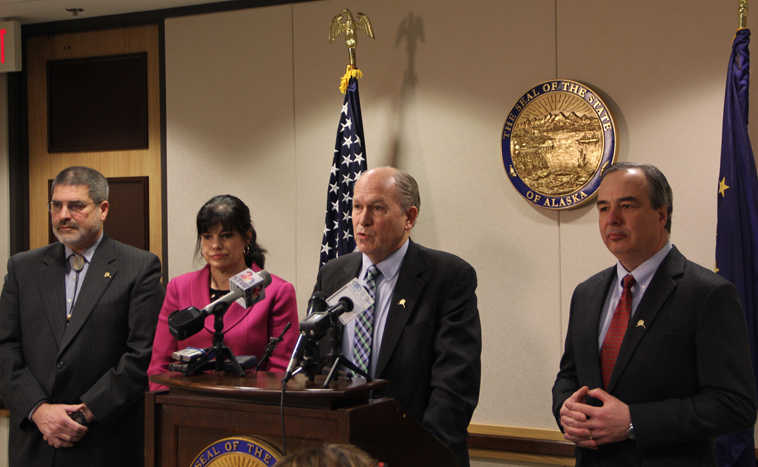The leaders of the Alaska LNG Project coalesced at a press conference Feb. 17 to quell uncertainty about the project’s future, but vague statements ultimately led to more questions than answers.
Gov. Bill Walker said in opening remarks that his administration began discussions with the producer partners in the project — BP, ConocoPhillips and ExxonMobil — about how to continue the project at a time when margins are thin for everyone involved.
“The elephant in the room has been for some time — what do we do in the challenging times of low oil prices and how does that impact the project?” Walker said.
Simply put, a continued low oil price environment could impact the decision to continue the project beyond 2017, when the decision to move into the front-end engineering and design, or FEED, stage is set to be made, Walker acknowledged.
The governor said he appreciates the companies’ willingness to begin evaluating possible changes to the project structure now, rather than in a year or so when the FEED decision was to be made.
Along with entering the two- to three-year FEED stage comes a collective investment of up to $2 billion to fund the work, so it is one of several potential stopping points.
More will be known in a month or so as to whether changes to the project structure are needed to keep it going, according to Walker.
“The goal is to have the project proceed — momentum maintained — and have the lowest-cost project both from a construction standpoint and an operational standpoint as well,” he said.
ConocoPhillips Alaska President Joe Marushack said the “economic headwinds are pretty tough right now” and revising the current rough cost estimate of $45 billion to $65 billion in the remaining preliminary front-end engineering and design, or pre-FEED, stage will help determine if the project is financially viable.
BP Alaska President Janet Weiss and project manager Steve Butt of ExxonMobil emphasized that the focus now is on getting the lowest possible cost of natural gas supply in the remaining pre-FEED schedule that has already been funded.
“BP really wants to see this project; Alaska needs this project; it’s an important project in BP’s portfolio,” Weiss said.
Butt noted that ExxonMobil has spent more than $500 million on the project to date and will continue to spend more as the roughly two-year pre-FEED process wraps up this fall. A narrower project cost estimate is expected at the end of pre-FEED.
“It’s been a real privilege for ExxonMobil to lead this project and commit the majority of resources to the project and we’re glad to have that opportunity and look forward to working with the parties on forward options,” he said.
Rebecca Logan, general manager of the Alaska Support Industry Alliance trade group, said she was happy to see the project partners unite during tough times.
She commented that the financial pressure a low-oil price environment should not be compounded by higher industry taxes.
Part of Walker’s proposed overhaul of the state’s fiscal regime is tax increases on nearly every major industry in the state, which for the oil and gas industry means closing some loopholes and raising the minimum oil production tax by 1 percent from 4 percent to 5 percent.
“We know we have to have a strong oil industry here (in Alaska) to support AK LNG,” Logan said.
A lack of progress on commercial negotiations for eight major issues — starting with the foundational Gas Balancing Agreement primarily between the producers — could push the timeline back two years.
A constitutional amendment allowing the state to enter into long-term contracts that essentially set tax policy for the life of the project must be voted on by the public in a general election year, either this November or in 2018. Walker has said his administration would not propose an amendment without first having the agreements in place for the Legislature to review.
That was all supposed to happen during a special legislative session this spring in to meet the statutory deadline of June 23 to have the amendment on the November ballot.
House Speaker Mike Chenault told the Associated Press in a statement that he would have liked more concrete information from the news conference but that he welcomes greater scrutiny of the project costs.
Walker would not rule out the possibility of hitting the target dates and also said they “may not be as critical as they once were from a timing standpoint.”
Marushack, from ConocoPhillips, conceded meeting the near-term goals is unlikely, as members of the administration directly involved in the negotiations have said to the Journal.
The producers have made it clear they require fiscal — tax — certainty over the 25-year life of the project.
Walker alluded to financial terms that could remove the need for a constitutional amendment but said it is too soon to expand on what those might be.
Elwood Brehmer can be reached at elwood.brehmer@alaskajournal.com.

